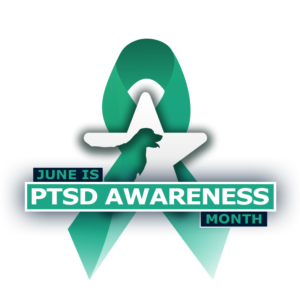June Marks Post-Traumatic Stress Disorder Awareness Month
 June is Post-Traumatic Stress Disorder (PTSD) Awareness Month. As a service dog organization that supports Service Members and Veterans with both visible and invisible wounds, we’ve seen some of the best therapy come with four legs and a wet nose. For those who suffer from PTSD, canine-assisted therapy can be a huge help with recognizing triggers, reducing anxiety, and increasing social integration, among many other benefits.
June is Post-Traumatic Stress Disorder (PTSD) Awareness Month. As a service dog organization that supports Service Members and Veterans with both visible and invisible wounds, we’ve seen some of the best therapy come with four legs and a wet nose. For those who suffer from PTSD, canine-assisted therapy can be a huge help with recognizing triggers, reducing anxiety, and increasing social integration, among many other benefits.
This month and every month, WCC is committing to help fight the stigma around PTSD, providing support to and advocating for Service Members and Veterans who are battling PTSD. In fact, WCC is proud to have been chosen to staff two of the five sites for the Puppies Assisting Wounded Service Members and Veterans Therapy Act (PAWS Act) pilot program being provided under the auspices of the Department of Veterans Affairs. This program will provide canine training to eligible Veterans who have been diagnosed with PTSD as a complementary and integrative health program.
One Veteran who participated in WCC’s Mission Based Trauma Recovery (MBTR) program anonymously shared, “My mindset was pretty combative, and I brought the war home with me when I returned from my first and second deployment in 2010 and 2012. When I tried to get a job, go to college, I struggled. When I started with Warrior Canine Connection, I didn’t know how to pretend to be happy. No amount of social discomfort was going to stop me from learning how to up my pitch a little bit to help these dogs out because these really are amazing animals and anything I give in to helping them, I feel I get back tenfold. I like to say I’m volunteering but what I don’t tell people is that the dogs are really helping me. The benefits of working with the dogs have helped me feel that I’m becoming a functional member of our society and the satisfaction that I get from that is hard to quantify.”
It’s important to note that training service dogs or having one isn’t a magic pill to combat PTSD—it takes a lot of hard work, time, and commitment. And it’s one of many effective, integrative treatments endorsed by the medical community to support Veterans battling PTSD. The key is to know that help is available, find the options that work best for you, and know that you are not alone.
If you or someone you know need is interested in WCC’s MBTR training, you can learn more here. And if you’re unsure where to turn first, please know the Veterans Crisis Line (1-800-273-8255) is available 24/7.


